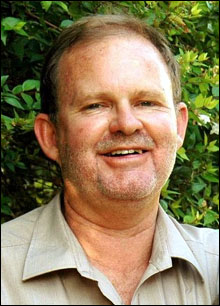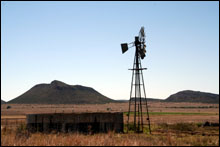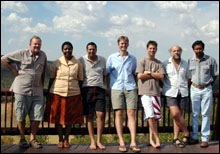Of war zones and cornerstones
|
- By Johan Pauw, Head of SAEON
SAEON is progressing well on all fronts and interesting new developments are taking place.
A primary development is that SAEON's Observation Science Specialist, Prof Tim O'Connor has started drafting a core science plan for SAEON. In a nutshell it can be said that this plan will be the glue that holds all the SAEON Nodes together in as much as that it will define the core environmental variables that must be measured to facilitate a confident pronouncement on the direction of environmental change across scales and regions.
The plan will be based on the questions that should be asked today in order to inform environmental policy in decades to come. The plan therefore requires some foresight in order to formulate the right questions. It is not constrained by a real budget, but must obviously concentrate on sensitive indicators of real and prolonged change and how those may be measured with limited resources.
As per SAEON's network principle, the implementation of the core science plan should be a joint effort by SAEON participants, facilitated by the nodes. The plan would therefore be workshopped and made available for comment in due course. Please write to timoconnor@xsinet.co.za should you wish to register suggestions.
SAEON Nodes
The recruitment of a Manager for the SAEON Fynbos Node to be based at Kirstenbosch is well under way as can be inferred from the job advert published in Sunday Times as well as in this newsletter.
A task team of SAEON's Technical Steering Committee spent three days on site visits to a number of organisations that had offered to host the SAEON Node for Arid Lands. The outcome of the exercise was a recommendation to SAEON that the node be established in Kimberley in conjunction with the South African National Parks, the McGregor Museum and various other relevant organisations. The Task Team felt that locating the Node in Kimberley will provide SAEON with credible geographical spread in its nodes and that the node would play a special coordinating role in the Northern Cape. The recommendation awaits approval by the Technical Steering Committee and the SAEON Advisory Board.
Botswana comes on board
A welcome development within the ELTOSA (Environmental Long-Term Observatories of Southern Africa) fraternity is the addition of a country member, Botswana. The Botswana Government has given official support for the establishment of a national network, to be known as the Botswana Environmental and Natural Resource Observation Network (BENRON). Other members of ELTOSA are Namibia, Mozambique and Malawi, and a good relationship has been established with the Seychelles.
The ELTOSA 2007 meeting will be hosted by SAEON at its Ndlovu Node.
War zones can be constructive
The SAEON staff members held a three-day planning meeting and although the meeting at some stages resembled a war zone, it turned out to be very constructive. Heated meetings at these early stages of SAEON's development are to be expected due to the level of uncertainty and the diffuse background of the members.
The fiercest debate raged about the prominence and feasibility of the concept of one or more core sites per node and how consistently this should be applied. This debate is sure to continue for some time. Another serious debate dealt with data policy, more especially on data from external sources. SAEON's own data will generally be in the public domain, but data from other providers and sources would often be restricted for a variety of reasons. This debate has led to the organisation of a dedicated data workshop for the SAEON Node and SAEON Data Managers in the near future.
DST a cornerstone for SAEON's establishment
With two SAEON nodes already fully operational, another two will soon have their Managers appointed and the final two nodes will in all probability be formally and legally arranged with the respective node host organisations.
Obviously this growth of SAEON's operations must be funded and in this regard the Department of Science and Technology is the cornerstone of SAEON, having increased its annual support for SAEON from R 5m to R 7m in the present financial year and committing to a budget of R 15m as of the next financial year.
This substantial amount within the National System of Innovation is not comprised of money siphoned away from other funding streams, but in fact represents a newly created funding stream.
The Department's support of SAEON deserves network-wide appreciation and bodes well for SAEON's sustainability.













